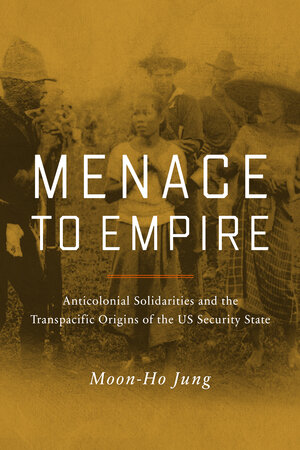The Book
Menace to Empire
The Author(s)
Moon-Ho Jung

Moon-Ho Jung’s Menace to Empire: Anticolonial Solidarities and the Transpacific Origins of the U.S. Security State is important in giving readers a transnational understanding of Asian Americans and explaining the rise of the U.S. security state. Jung argues that racialized and transnational Asians engaged in revolutionary politics against the U.S. Empire, which resulted in the U.S. national security state. At the heart of this book are the anticolonial revolutionaries who hail from the Philippines, Japan, Hawaii, and even (the rarely mentioned) South Asian immigrants within the United States. These Pan-Asian solidarities caused racialized fear and imperial insecurities in the U.S. empire. Jung believes some of these fears were founded on racial prejudice, capitalistic expansion, and imperialism instead of facts. One example is the case of the Philippines, where claims of anarchy led to the Philippine Constabulary (the predecessor to the Philippine National Police) and the Sedition Act and opened the door for eventual U.S. Sovereignty. Jung’s history forces readers to confront issues of democracy and whether the United States is a “nation of immigrants” or simply a racialized imperialist nation-state driven by white supremacy and capitalist expansion that erected national security to protect whites from non-whites. Jung’s utilization of a transpacific framing, buoyed by transpacific sources from the Philippines and the United States government, makes his work unique and significant.
Readers familiar with Jung’s work, such as his article Beyond These Mythical Shores: Asian American History and the Study of Race will not be surprised at Jung’s nuanced argument and expertise in Asian American history, particularly with regard to critiques of race, nation, and empire in U.S. history. A summary of Beyond These Mythical Shores begins with Jung arguing that the US officials found an excuse to intervene in the Philippines by conjuring up images of the Philippines as backward and devolving into anarchy. He would then shift the focus to the US being alarmed at the rise of Japan and its alliance with the Philippines in chapter two. Chapters three and four would trace the rise of the US security state due to Asian revolutionaries, while the last two chapters provide an analysis of interimperial discourses. What is unique with Jung’s perspective is his transnational perspective of Asian Americans, which is valuable for challenging national boundaries and critiquing immigration and national security issues. Also, it can bring differing fields into dialogue. Jung does both in Menace to Empire by expanding the familiar origins of Asian American past California and San Francisco to include many other parts of the world. Jung also extends U.S. origins from settler colonialism to “liberal multicultural settle colonialism”[1], particularly in California and Hawaii. Asian American intellectual historians will find some familiar names such as Har Dayal, Sen Katayama, Agnes Smedley and Carlos Bulosan, the author of America is in the Heart: A personal history, alongside unfamiliar names such as Karl Yoneda and Taraknath Das.
One question readers may have is in the positioning of Japan as both the organizer of most of the anticolonial, Pan-Asian solidarities while also being part of the imperial powers. Though Jung admits to Japan having “contradictory possibilities” as both a “menace to white supremacy” and a “rising empire,” he seems to excuse Japan’s role in being a menace to other Asian nations[2]. Readers are left to wonder if Imperial Japan can be truly be seen as anticolonial when it had colonies in Korea, Taiwan and other Asian regions. Another question readers may have is about the conflation of “Asians” with “radical Asians”—whether this is just a tactic that the United States government intentionally utilized to its advantage or is it because of Jung’s background as someone who is used to emphasizing the work of Asian American radicals. Ultimately, this is a well-researched book primarily for scholars and educators interested in a different conception of traditional American narrative to include Asian American actors. Those with an interest in Asian American History, U.S. foreign policy, U.S. Imperialism, and the origins of the U.S. security state will find this book a fascinating read.
[1] Jung, Menace to Empire, 21.
[2] Jung, 18.
About the Reviewer
Ang Li is a bi-lingual ABD Ph.D. student at the University of Texas at Dallas (UTD). He has presented at a few conferences and is a research assistant for the Center of Asian Studies at UTD. He is currently working on a dissertation involving women missionaries who went to China.

2 Thoughts on this Post
S-USIH Comment Policy
We ask that those who participate in the discussions generated in the Comments section do so with the same decorum as they would in any other academic setting or context. Since the USIH bloggers write under our real names, we would prefer that our commenters also identify themselves by their real name. As our primary goal is to stimulate and engage in fruitful and productive discussion, ad hominem attacks (personal or professional), unnecessary insults, and/or mean-spiritedness have no place in the USIH Blog’s Comments section. Therefore, we reserve the right to remove any comments that contain any of the above and/or are not intended to further the discussion of the topic of the post. We welcome suggestions for corrections to any of our posts. As the official blog of the Society of US Intellectual History, we hope to foster a diverse community of scholars and readers who engage with one another in discussions of US intellectual history, broadly understood.
Thanks for this excellent review! So much of twentieth-century U.S. political, military, and diplomatic history hinges on the Philippines. This will be a great addition to my imperialism shelf.
Small note: The opening sentence of the opening paragraph has a minor typo (solitaires rather than solidarities). – TL
Thanks Tim for the comment and the suggestion. I’ll see about correcting it.
-Ang